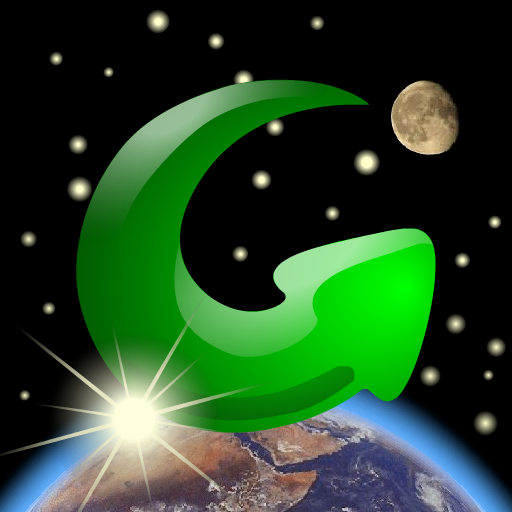Review: GoSkyWatch Planetarium
by Jeff Noble
August 22, 2008
Overview
Look! Up in the sky?! ... No, down on your iPhone. It's the entire night sky on your iPhone! GoSkyWatch Planetarium is more than a mouthful, and I'm surprised it doesn't make your iPhone heavier simply because of how much data it contains.
Ever wondered what a star in the night sky was? GSWP will help you easily identify any star you see, according to your location, time of year, viewing angle and direction that you're looking. It is simply a wonderfully fun app, especially for educational purposes. My kids are going to freak out.
 - Play. When you push this, the sky/globe begins to rotate, showing you how the positions of the stars and planets changes with the passing of time. At the top of the screen, you'll see the timer advance after pressing forward. You can stop it and rewind it as well.
- Play. When you push this, the sky/globe begins to rotate, showing you how the positions of the stars and planets changes with the passing of time. At the top of the screen, you'll see the timer advance after pressing forward. You can stop it and rewind it as well.
 - Search. This pulls up a list that allows you to search for planets, constellations, stars, and deep space objects. The U.S.S. Enterprise was not included in the search results of the latter. Darn. One nice thing about this is that only the objects visible from your location are available to be searched for. The other objects are grayed out, indicating you can't see them from your sky at this time of year.
- Search. This pulls up a list that allows you to search for planets, constellations, stars, and deep space objects. The U.S.S. Enterprise was not included in the search results of the latter. Darn. One nice thing about this is that only the objects visible from your location are available to be searched for. The other objects are grayed out, indicating you can't see them from your sky at this time of year.
 - Magnify. Very cool feature here. Pushing this brings up a slider which essentially brings the stars and objects closer to you. This was very useful because I could judge by the ambient light around me just how many stars I could actually see. If I was out in the country, I would imagine I would be able to see more stars. The magnification feature can show you what you might be able to see if your conditions were better.
- Magnify. Very cool feature here. Pushing this brings up a slider which essentially brings the stars and objects closer to you. This was very useful because I could judge by the ambient light around me just how many stars I could actually see. If I was out in the country, I would imagine I would be able to see more stars. The magnification feature can show you what you might be able to see if your conditions were better.
 - Options. This is the screen where you set your current location (or any location), the date and time, night mode and all kinds of other preferences. The other preferences includes such features as showing the ecliptic image, the horizon grid, lines, boundaries, etc. It even has the ability for you to make the call whether Pluto is a planet or not. I thought he was Mickey's dog.
Night mode is a nice feature as well. Instead of having to look at a bright iPhone screen which could blind you and prevent you from adjust well to the dark, it puts all points of light in red and turns the rest of the screen black. This enables you to use it, uh, in the dark... Which is when you would be able to see stars.... Unless it is daytime and someone hits you over the head... Nevermind, you get the picture.
- Options. This is the screen where you set your current location (or any location), the date and time, night mode and all kinds of other preferences. The other preferences includes such features as showing the ecliptic image, the horizon grid, lines, boundaries, etc. It even has the ability for you to make the call whether Pluto is a planet or not. I thought he was Mickey's dog.
Night mode is a nice feature as well. Instead of having to look at a bright iPhone screen which could blind you and prevent you from adjust well to the dark, it puts all points of light in red and turns the rest of the screen black. This enables you to use it, uh, in the dark... Which is when you would be able to see stars.... Unless it is daytime and someone hits you over the head... Nevermind, you get the picture.




